-
Address: 10655 FM 1097 Willis, TX 77318
-
Phone: (936) 465-9981
-
Email: service@tghinsurance.com

The allure of open roads, scenic landscapes, and the freedom of a nomadic lifestyle make living in a recreational vehicle (RV) an increasingly popular choice.
While this way of life promises an exciting, nomadic adventure, it is crucial for full-time RV dwellers to secure appropriate insurance coverage. Just as a homeowner protects their dwelling, full-time RVers must safeguard their mobile homes from various risks.
In this comprehensive guide, we delve into the intricacies of full-time RV insurance, shedding light on its significance, what it entails, and how you can make the most of it to ensure your free-spirited journey remains worry-free.
Understanding Full-Time RV Insurance
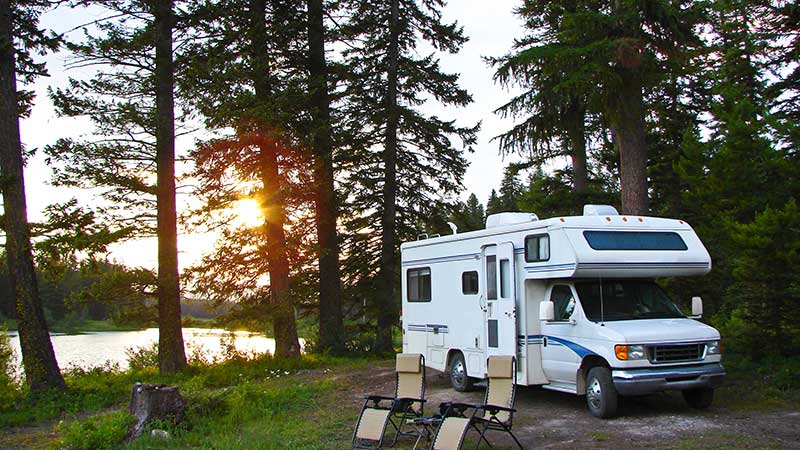
Insurance for full timers, specifically tailored for those who consider their RVs as their primary homes, is a unique form of coverage that offers a safety net well beyond that of standard RV insurance.
By comprehensively addressing the unique risks faced by full-time RV dwellers, it provides peace of mind so you can truly enjoy your nomadic lifestyle.
Here, we delve deeper into the core aspects of full-time RV insurance, which cover a vast spectrum of eventualities.
Liability Coverage
One of the pillars of any insurance policy, liability coverage, is equally essential in full-time RV insurance.
It acts as your financial shield in case of unfortunate incidents where you’re deemed responsible for causing harm to another person’s property or causing physical bodily injury, while using your RV.
This could be anything from an uninsured motorist accidentally backing into your vehicle at an RV park to someone tripping over your outdoor camping equipment.
With potential liabilities being diverse and unpredictable, this coverage ensures you’re not caught off-guard by hefty compensation or legal fees.
Comprehensive Coverage
As the name implies, comprehensive coverage casts a wide net of protection over your RV, addressing various unexpected situations.
This includes a broad spectrum of non-collision related incidents like damages due to inclement weather conditions, falling tree branches, fire, theft, or acts of vandalism.
So whether a hailstorm leaves your RV dented, a thief breaks in, or a wild animal causes damage while your RV is parked, comprehensive coverage has you covered, including for medical expenses.
It’s an indispensable aspect of full-time RV insurance, helping you avoid the financial strain of repairing or replacing your RV – your primary residence.
Personal Property Coverage
Your RV isn’t just a vehicle—it’s your home, filled with personal belongings that also need protection.
Full-time RV insurance recognizes this by offering personal property coverage. It provides security for items inside your RV, from practical kitchen appliances and cozy furniture to valuable electronics and personal effects.
If these belongings are stolen, damaged, or destroyed in natural disasters, personal property coverage can help offset the costs of replacement or repair.
It’s not just about the financial value of these items, but the role they play in making your RV feel like home.
This coverage adds a layer of comfort and security to your nomadic lifestyle.
Full-Time Liability Coverage
Standard liability coverage and homeowners insurance can fall short for full-time RVers due to the unique risks associated with living in an RV full-time.
That’s where full-time liability coverage comes in.
This home insurance aspect is designed to protect you from liabilities that might occur when your RV is stationary and being used as a residence.
This could include someone sustaining an injury within your RV, or accidents happening in the immediate vicinity of your parked RV, which could make you legally liable.
For instance, if a friend visits and slips within your RV, or a neighbor at the RV park trips over your barbecue grill, the various medical bills, expenses or liability claims could be covered under this provision.
Summary
In summary, full-time RV insurance offers an umbrella of protection catering specifically to the needs of those who have embraced the RV lifestyle.
From covering your home-on-wheels and personal belongings to protecting against legal liabilities, full-time RV insurance keeps you secured as you navigate the thrilling freedom of the open road.
Differences Between Full-Time RV Insurance and Auto Insurance
Although a recreational vehicle (RV) is a type of vehicle, the insurance requirements and coverages for a full-time RV significantly differ from standard car insurance.
The main difference stems from the dual role an RV plays as both a vehicle and a living space.
This section will delve into the key differences between full-time RV insurance and auto insurance.
Understanding the Nature of Usage
The most fundamental difference between RV and auto insurance lies in how the vehicles are used. An RV, particularly for full-timers, is more than just a mode of transportation – it’s a home. This dual usage necessitates additional coverages that go beyond what’s typically included in a standard auto insurance policy.
Coverage Scope
- Personal Property Coverage: Auto insurance typically doesn’t cover personal belongings inside the vehicle. Full-time RV insurance, on the other hand, offers personal property coverage as standard due to the nature of RV use. This means your personal belongings, such as appliances, furniture, and personal effects, are protected.
- Full-Time Liability Coverage: Full-time RV insurance often includes full-time liability coverage, which protects you if someone is injured in or around your RV while it’s parked at a campsite or RV park. This coverage is not typically part of a standard auto insurance policy and helps to ensure medical payments coverage.
- Additional Living Expenses: Some full-time RV insurance policies provide coverage for additional living expenses, paying for costs like hotel stays if your RV is damaged and uninhabitable. Auto insurance does not typically offer this coverage.
Policy Cost
Due to the extended coverages, the average full-time RV insurance cost is often more expensive than standard auto insurance.
However, the cost can vary significantly based on factors like the RV’s value, where you travel and park, your chosen deductibles, and the extent of coverage selected.
Flexibility
Full-time RV insurance offers flexibility that aligns with the lifestyle of RVers.
For example, most policies allow you to suspend some coverages when you’re not using your RV, something that’s not usually an option with car insurance.
Understanding these differences will help you comprehend why full-time RV insurance is not only a good idea but often a necessity for those living in their RVs full-time.
Insurance for full timers offers comprehensive protection for your home-on-wheels and the peace of mind you need to fully enjoy the freedom and adventure of the full-time RV lifestyle.
Navigating the Selection Process for Full-Time RV Insurance
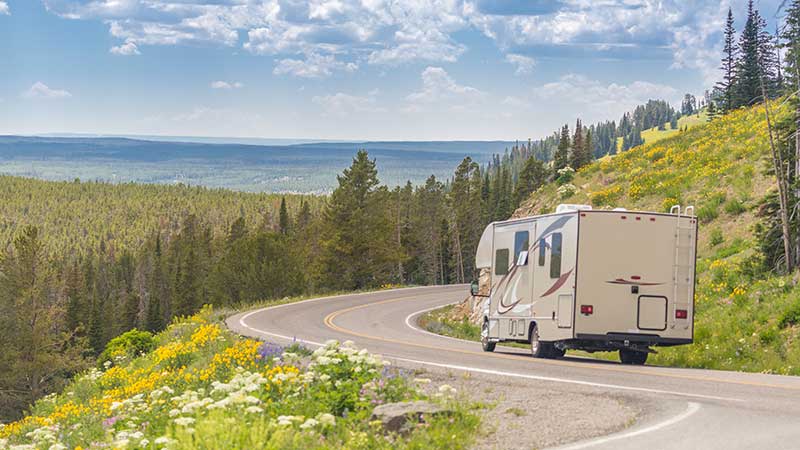
When choosing full-time RV insurance, it’s crucial to consider several key factors that relate to your unique nomadic lifestyle.
A policy isn’t one-size-fits-all, and there’s a lot to think about to make sure you’re choosing the best coverage for your specific needs.
Here are some in-depth considerations to guide your decision-making process.
Assessing Your Insurance Needs
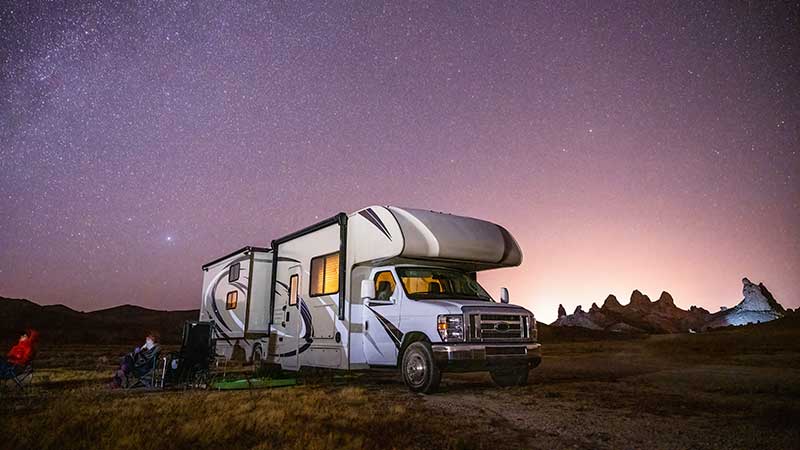
Your first step should be a careful evaluation of your lifestyle and how it translates into insurance needs.
Consider the value of your RV and the personal belongings within it. An RV outfitted with high-end appliances and fixtures, for example, may require higher personal property coverage.
Think about where you plan to travel, as certain regions may have specific risks that require additional coverage.
Also, take into account your financial constraints. Determine what premium and deductible amounts are comfortable for your budget.
Remember, it’s about striking a balance between cost and protection; choosing the cheapest policy might save money upfront, but could cost more in the long run if you’re underinsured.
Evaluating RV Insurance Companies
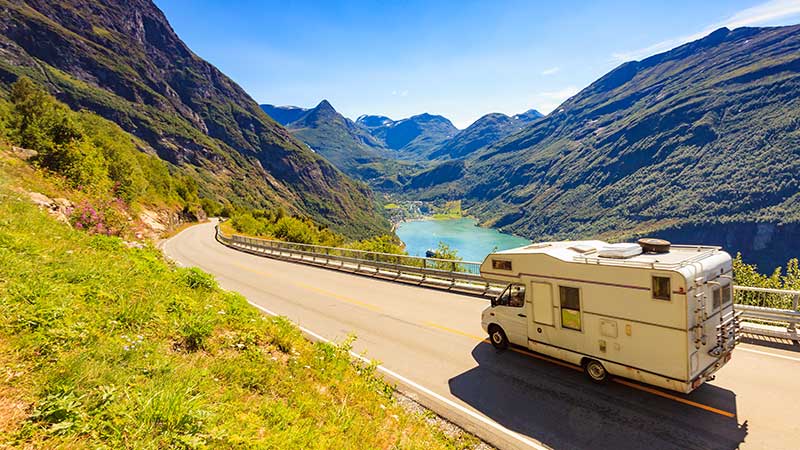
Not all RV insurance companies or RV insurance agent are created equal, and it’s important to select an RV insurance company that aligns with your needs and offers reliable support.
Financial Stability and Reputation
Prioritize RV insurance companies that are financially stable and have a strong reputation in the industry.
This helps ensure that they can cover claims and are reliable.
Check third-party ratings from organizations like A.M. Best or Consumer Reports for unbiased information.
Coverage Options and Flexibility
Look for RV insurance companies who offer policies tailored for full-time RV living.
They should offer a range of coverage options and flexibility to adjust these as per your evolving needs.
Customer Service and Claims Processing
It’s crucial to have a RV insurance provider that’s responsive and easy to deal with.
Check customer reviews about RV insurance companies’ experience with claims processing.
The faster and smoother the claims process, the quicker you can get back on the road after an incident.
Discounts and Added Benefits
Ask about available discounts.
Some RV insurance providers may offer discounts for safety features installed in your RV, having multiple policies with them, or being a member of RV associations.
These can significantly reduce your premiums.
Understanding Policy Limitations and Exclusions
Every insurance policy comes with its fine print, and it’s crucial to be aware of these.
Carefully read the policy document to understand any limitations, exclusions, or conditions that could impact your coverage.
For example, some policies might exclude certain types of damages, or only offer limited coverage for personal belongings. This could leave you underinsured in the event of a claim.
If there’s anything you don’t understand or need more clarification on, don’t hesitate to ask the provider.
Summary
Choosing the right full-time RV insurance is a critical step in your RV lifestyle journey.
Taking the time to evaluate your needs, compare providers, and understand your chosen policy will help ensure you have the right protection, allowing you to enjoy your nomadic life with greater peace of mind.
Effective Ways to Lower Your Full-Time RV Insurance Cost

While full-time RV insurance is indispensable for those embracing the nomadic lifestyle, it’s natural to look for strategies to manage costs without compromising the quality and extent of your coverage.
Here are some in-depth strategies that can effectively lower your insurance premiums.
Bundling Insurance Policies
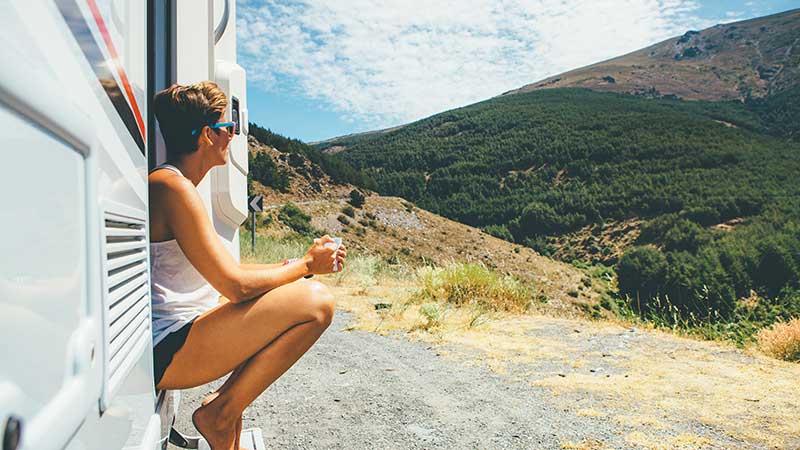
One of the most effective ways to reduce insurance costs is through bundling, which refers to purchasing multiple types of insurance from the same provider.
For instance, if you already have an auto, motorcycle, or homeowner’s insurance policy with a company, adding your RV insurance to that bundle can result in significant discounts.
Bundling can simplify your insurance management, as you’ll only have one point of contact for your policies, and it often leads to streamlined customer service.
Installing Safety and Security Features
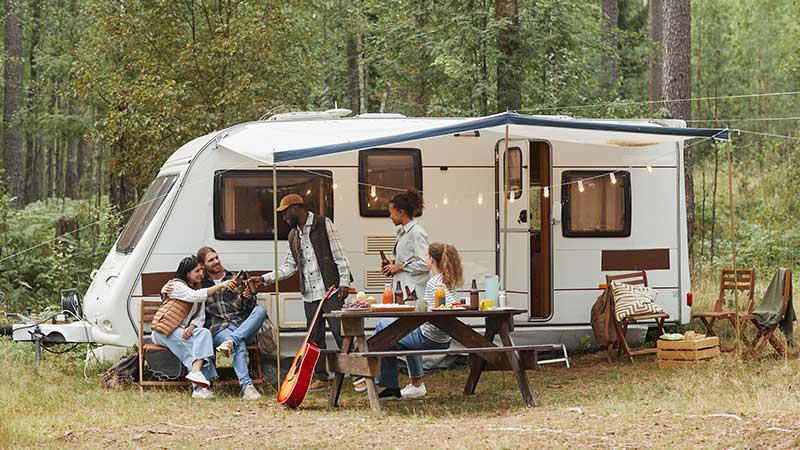
Equipping your RV with up-to-date safety and security features can impress insurers and lead to reduced premiums.
These enhancements signal that you’re a lower risk, as they can prevent accidents or theft, or minimize property damage.
Examples include smoke and carbon monoxide detectors, burglar alarms, security cameras, GPS tracking devices, advanced anti-lock brake systems, and stability control systems.
You may also consider taking RV driving courses to improve your safety on the road, as some insurance providers offer discounts for this initiative.
Maintaining a Clean Driving Record
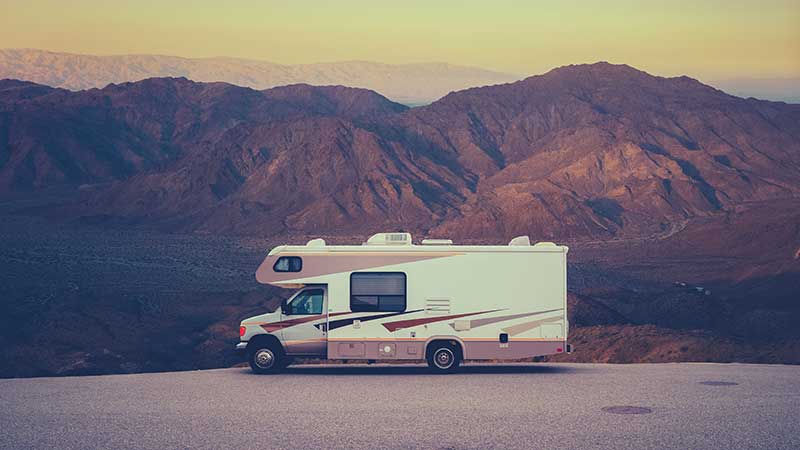
Your driving history is a key factor insurers consider when determining your premiums.
Demonstrating safe, responsible driving habits can earn you lower insurance rates over time.
This means avoiding traffic violations, from speeding tickets to more serious offenses, and minimizing claims on your policy.
Keeping accidents and claims to a minimum indicates to insurance providers that you’re a lower risk, which can be rewarded with decreased insurance premiums afterwards.
Capitalizing on Discounts and Loyalty Programs
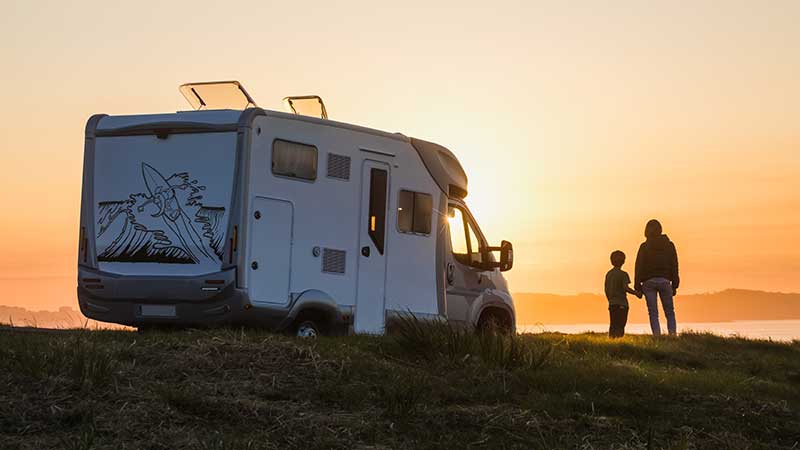
Many insurance companies offer a variety of discounts or loyalty programs as incentives for policyholders.
These could be related to a range of factors, from maintaining a good driving record to being a long-time customer.
Ask your provider about available options. For example, you might qualify for a discount if you’re a member of an RV association, have completed a defensive driving course, or choose paperless billing.
Also, consider programs that reward customer loyalty, like accident forgiveness or diminishing deductibles.
Summary
By employing these strategies, you can effectively manage your insurance costs while still ensuring you have comprehensive coverage.
Remember, the goal isn’t merely to find the cheapest insurance, but to find the best value – quality protection that suits your full-time RV lifestyle at a cost that fits within your budget.
Selecting the Best RV Insurance for Full-Time Living
Choosing the best RV insurance for full-time living is a crucial decision that shouldn’t be taken lightly.
The right insurance policy will provide the essential coverages you need while offering the peace of mind that comes from knowing you’re fully protected.
Here are some steps to help you find the best RV insurance for your needs.
Understand Your Unique Needs
The best RV insurance for you is the one that fits your specific needs.
Consider factors such as the value of your RV, the personal belongings you carry, your travel habits, and the areas you frequent.
For full-timers, your RV is not just a vehicle—it’s your home.
Therefore, the insurance policy should provide comprehensive coverage that protects all aspects of your RV life.
Evaluate Multiple Insurance Providers
Different insurance providers offer different coverage options, benefits, and premium rates.
Research and compare several companies based on their coverage, reputation, customer service, and price.
Check customer reviews and ratings from trusted sources to assess the insurers’ reliability and performance.
Consider Specialized RV Insurance Providers
Some insurance providers specialize in RV insurance and understand the unique needs of full-time RVers.
These companies can offer specialized coverages that general auto insurers might not provide, such as full-time, property damage liability coverage, personal belongings coverage, and coverage for additional living and medical expenses.
Look for Flexible Coverage Options
The best RV insurance policies offer flexibility to adjust coverages based on your changing needs.
This could include options to suspend coverages when your RV is in storage or adjust deductibles and coverage limits as your situation changes.
Check for Discounts
Many insurers offer discounts that can significantly lower your premiums.
You might be eligible for discounts for bundling policies, installing safety features, maintaining a good driving record, or being a member of RV clubs.
The best RV insurance for full timers? For you, it’ll will be the one that offers valuable discounts without compromising on coverage.
Seek Professional Advice
An experienced insurance agent can be an invaluable resource in helping you navigate the complexities of RV insurance.
They can assess your situation, provide expert advice, and help you find the best policy for your needs.
Summary
Remember, the “best” RV insurance is subjective and varies depending on individual circumstances.
Investing the time to thoroughly evaluate your needs and options will help ensure you select the best possible RV insurance for your full-time lifestyle.
Enjoy the freedom and adventure of the open road with the confidence that you’re well-protected by the right insurance policy.
Navigating Common Pitfalls of Full-Time RV Insurance
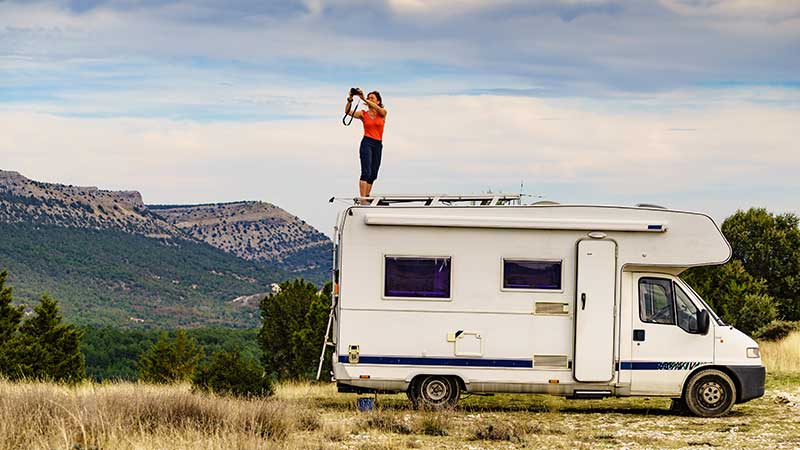
Securing the right full-time RV insurance is paramount to a smooth and worry-free nomadic lifestyle.
However, there are common pitfalls you could fall into if not careful.
Here are these potential mistakes, expanded upon, to help you avoid them.
Underestimating Coverage Needs
It’s easy to underestimate the amount of coverage you need, especially if you’re new to the full-time RV lifestyle.
Remember that your RV isn’t just a vehicle – it’s also your home, containing your belongings and assets.
The costs to repair or replace it, or to replace personal belongings damaged in an incident, can quickly add up.
Thus, ensuring that your coverage limits are sufficient to protect your RV, personal belongings, and potential liabilities is critical.
This could include considering extra optional coverages too, like increased liability limits, or specialized coverages such as full replacement cost coverage for a new RV.
Neglecting to Update Coverage
Life changes, and so should your insurance coverage.
If you’ve upgraded your RV, added valuable items, or relocated (even if just your campsite location), you should review your policy and adjust it accordingly.
For instance, if you’ve upgraded your RV’s interior or added solar panels, your current coverage might not fully cover these enhancements.
Similarly, if you’ve moved from a relatively safer to a riskier area (like from a low-crime to a high-crime region or from a mild-climate region to a storm-prone one), you may need to adjust your coverage.
Regularly revisiting your policy ensures it stays aligned with your current needs.
Overlooking Policy Details and Fine Print
The devil is often in the details, especially when it comes to insurance policies.
Many RV owners make the mistake of not thoroughly reading and understanding the policy’s terms and conditions, including the limitations, exclusions, and any specific requirements.
For instance, your policy might exclude certain types of damages or may not cover personal belongings to the extent you thought.
Or, there might be conditions you have to fulfill for your coverage to remain valid, like regular maintenance or inspection of your RV. Make sure you invest time in reading and understanding these details.
If there’s anything you don’t understand, consult with your insurance agent.
Overlooking Specialized Coverage Options
Depending on your lifestyle and unique needs, it might be beneficial to consider additional coverage options that aren’t included in a standard full-time RV insurance policy.
These could include roadside assistance, which can be a lifesaver if you break down in a remote area; emergency expenses, which can cover costs like hotel stays if your RV is being repaired; and campsite and vacation liability coverage, which covers you if someone gets injured around your campsite or your RV while parked.
These specialized coverages can provide extra peace of mind for relatively little additional cost.
Summary
By being aware of these common mistakes and actively taking steps to avoid them, you can ensure you have robust and relevant coverage that adequately protects your RV and your nomadic lifestyle.
Understanding RV Full-Time Insurance Deductibles
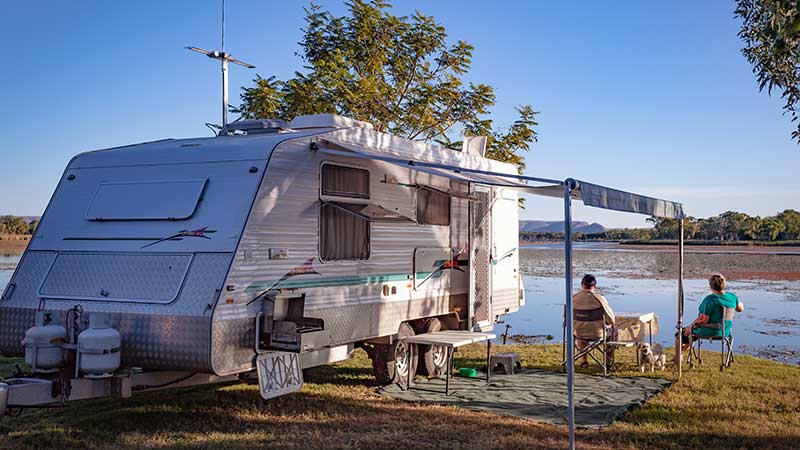
While the above sections have covered a broad spectrum of full-time RV insurance details, it’s crucial not to overlook the importance of insurance deductibles.
This section aims to provide an in-depth understanding of how deductibles work in full-time RV insurance and how you can make strategic choices regarding them.
What is a Deductible?
A deductible is the amount you agree to pay out-of-pocket towards a covered loss before your insurance policy kicks in.
For instance, if your deductible is $1,000 and you have a covered loss of $5,000, you would pay the first $1,000, and your insurance company would pay the remaining $4,000.
Types of Deductibles in RV Insurance
Generally, full-time RV insurance policies may have separate deductibles for different types of coverage.
For example, your policy may have different deductibles for comprehensive, collision, and personal property damage coverages.
Choosing the Right Deductible
Deciding on the right deductible requires careful consideration of your financial situation and risk tolerance. Here are some key factors to consider:
- Affordability: The deductible should be an amount you can comfortably afford to pay out-of-pocket if a covered loss occurs.
- Premium vs. Deductible Balance: Typically, a higher deductible means lower premiums, and vice versa. If you choose a high deductible, you can save money on premiums, but you’ll pay more out-of-pocket if an accident occurs. Conversely, if you prefer smaller out-of-pocket costs in case of a claim, you might choose a lower deductible but be prepared for higher premium costs.
- Risk Assessment: Assess your risk levels based on factors such as where you park your RV most often (Is it prone to theft or harsh weather conditions?), how often you move, and how experienced you are at driving the RV.
Reviewing and Adjusting Deductibles
Over time, your financial situation or risk tolerance may change.
It’s a good practice to review your deductibles periodically and adjust them as needed.
Additionally, if you upgrade your RV or acquire expensive items, you might want to lower your deductibles, meaning you’d pay less out-of-pocket if a claim needs to be filed.
Understanding deductibles and making informed decisions about them can significantly impact both your insurance costs and your financial security in case of a loss.
When in doubt, consult with your insurance agent to ensure you’re making the best choice for your unique situation.
Conclusion

Choosing a full-time RV lifestyle requires careful planning and a strong safety net, with comprehensive full-time RV insurance serving as a cornerstone.
By understanding its nuances, considering key factors when choosing a policy, and sidestepping common mistakes, you can navigate your journey with assured peace of mind. Whether you’re traversing well-worn paths or exploring uncharted terrains, the right insurance helps make every mile a worry-free experience.
For more information on full-time RV insurance, reach out to a trusted insurance agent or continue researching to find the perfect coverage tailored to your unique needs.
DISCLAIMER: RV insurance policies don’t cover full timers. But if you’re unsure or want to consult an agent, we’re only a call away.
Frequently Asked Questions about Full-Time RV Insurance
Here we address some frequently asked questions about full-time RV insurance:
Is Full-Time RV Insurance Legally Required?
While insurance requirements for RVs vary by state, typically, liability coverage is obligatory, and full-time RV insurance provides additional, crucial protection.
Can I Secure Coverage for My Personal Belongings Inside the RV?
Absolutely, full-time RV insurance typically includes coverage for personal belongings inside your RV, ranging from furniture and appliances to electronics.
Are There Any Geographical Limitations with Full-Time RV Insurance?
Most full-time RV insurance policies offer coverage for travel throughout the United States and Canada. However, it is vital to verify any possible restrictions or limitations.
